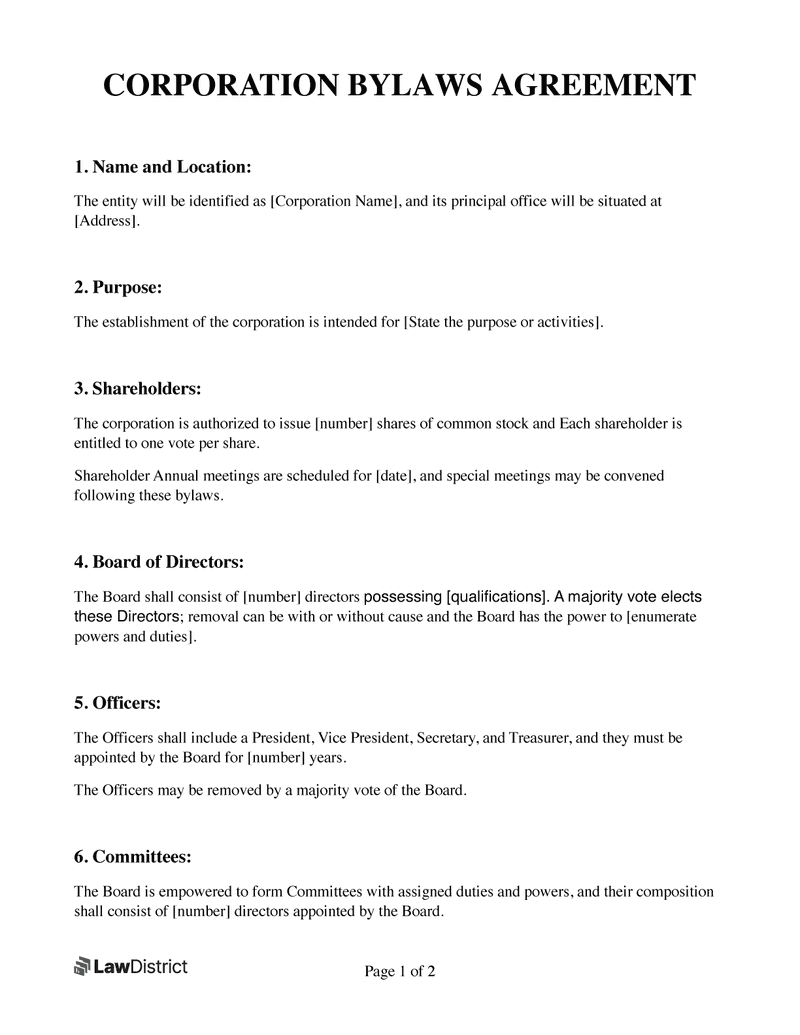
Effortlessly draft your Corporate Bylaws to establish the guidelines for managing your business operations. Use a fillable template to conveniently produce your document today.
Templates created by legal professionals
Customize your documents quickly & easily
24/7 free phone & email customer support

Last Update August 12th, 2024
Fill forms in a few steps
Save, print, & download
Done in 5 minutes
Table of Contents:Corporate bylaws is a vital legal document for any corporation, serving as the foundation for internal governance and management.
Bylaws, typically established by the board of directors at the time of incorporation, delineate the company's operational rules, responsibilities of directors, shareholders, and officers, and procedures for meetings.
They are crucial for maintaining order and clarity in corporate affairs. Unlike Articles of Incorporation, which establish the corporation's legal existence, Corporate Bylaws offer a detailed framework for how the company will operate and the rights and powers of the shareholders, directors, officers, and employees.
Creating Corporate Bylaws, even when not mandated by state law, is recommended as they articulate the business's operational procedures and ensure alignment among all stakeholders.
These bylaws come into effect upon formal adoption by the corporation’s directors and continue to guide the company's internal management.
While most states require corporations to have bylaws, they vary in terms of specifics and are generally not filed with the state, remaining internal documents.
There are various types of Corporate Bylaws, each serving a unique purpose. Understanding these types is crucial for any company to function effectively:
Each type plays a crucial role in helping guarantee that the corporation runs smoothly and in compliance with legal and regulatory standards in your circumstances.
If you're creating Corporate Bylaws for the first time, it's beneficial to review a sample.
Below, we provide an example for your reference.

Corporate Bylaws are essential for defining the operational and governance structure of a company. Listed below are the key elements to include:
These elements help ensure that the company operates under a clear, comprehensive framework, aligning with legal requirements and best practices for corporate governance.
In many states, it's a legal requirement for companies to maintain them. Refer to this table to determine if your state mandates Corporate Bylaws for corporations:
| State | Corporate Bylaws Requirement |
|---|---|
| Alabama | Yes |
| Alaska | Yes |
| Arizona | Yes |
| Arkansas | Yes |
| California | No |
| Colorado | No |
| Connecticut | Yes |
| Delaware | No |
| District of Columbia (D.C.) | Yes |
| Florida | Yes |
| Georgia | Yes |
| Hawaii | Yes |
| Idaho | Yes |
| Illinois | Yes |
| Indiana | Yes |
| Iowa | Yes |
| Kansas | No |
| Kentucky | Yes |
| Louisiana | No |
| Maine | Yes |
| Maryland | Yes |
| Massachusetts | Yes |
| Michigan | Yes |
| Minnesota | No |
| Mississippi | Yes |
| Missouri | Yes |
| Nebraska | Yes |
| Nevada | No |
| New Hampshire | Yes |
| New Jersey | Yes |
| New Mexico | Yes |
| New York | Yes |
| North Carolina | Yes |
| North Dakota | No |
| Ohio | No |
| Oklahoma | No |
| Oregon | Yes |
| Pennsylvania | No |
| Rhode Island | No |
| South Carolina | Yes |
| South Dakota | Yes |
| Tennessee | Yes |
| Texas | Yes |
| Utah | No |
| Vermont | Yes |
| Virginia | Yes |
| Washington | Yes |
| West Virginia | Yes |
| Wisconsin | No |
| Wyoming | Yes |
Corporate Bylaws and Articles of Incorporation are both crucial for companies, but they serve different purposes. Here's a table highlighting their differences:
| Aspect | Bylaws | Articles |
|---|---|---|
| Nature | Internal guidelines | Legal establishment |
| Content | Roles, procedures | Name, purpose, founders |
| Filing | Internal use | State filing, public |
| Purpose | Manage operations | Legal existence |
| Amendments | By directors/shareholders | State filing needed |
| Access | Private | Public |
Understanding these differences is key to effectively managing a corporation's legal and operational framework.
In addition to Corporate Bylaws, several related business documents are vital for companies. These include:
Each serves a unique purpose in defining the relationships and operations within a business entity.
To provide a clearer understanding of Corporate Bylaws, we have addressed some of the most commonly asked questions regarding this document.
Refer to the answers below for more insight into this document.
Typically, Corporate Bylaws do not need to be signed or notarized. They are internal documents and, unlike the articles of incorporation, are not usually filed with the state.
However, they should be formally adopted and approved by the corporation's board of directors. Once adopted, they become an official record of governance policies and procedures for the corporation.
Amending Corporate Bylaws is generally the responsibility of the board of directors. The specific process for amendments should be outlined within the bylaws themselves.
Often, a majority vote from the board is required to make any changes.
Additionally, some corporations may require shareholder approval for certain amendments, especially if they significantly alter shareholder rights or corporate governance structures.